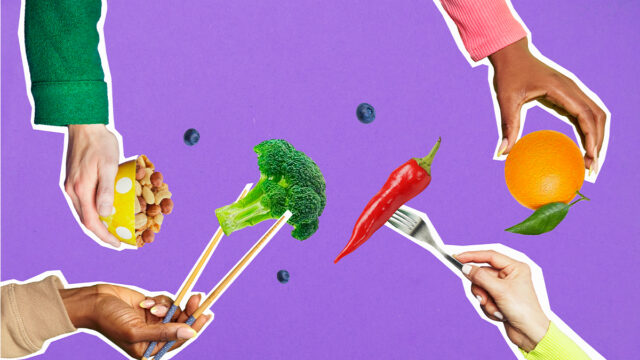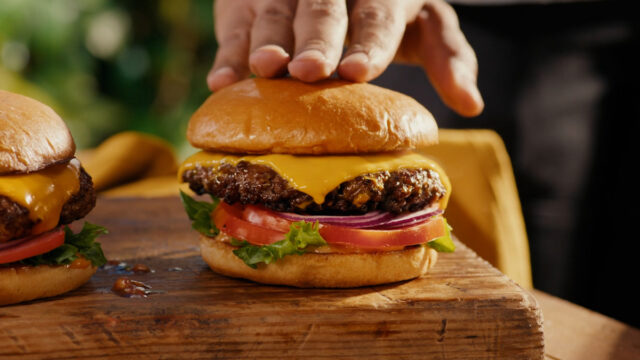Impossible Foods Debuts ‘Meatier’ Message to Target a Wide Demo
Inspiration meets innovation at Brandweek, the ultimate marketing experience. Join industry luminaries, rising talent and strategic experts in Phoenix, Arizona this September 23–26 to assess challenges, develop solutions and create new pathways for growth. Register early to save.
Impossible Foods, following through on a pledge in 2023 to revamp its marketing, debuted new branding and packaging for its meat alternatives, trying to boost a battered category and win over new consumers.
The effort, announced at the annual Natural Products Expo West conference near Los Angeles, addresses a few of the nascent industry’s pain points head-on: taste and healthfulness.
Impossible’s new look and positioning is “inspired by the craveability of meat” and targeted broadly at flexitarians, the massive number of Americans who say they want to eat fewer animal products and often swap out traditional for faux meat.
“We want to be inclusive to anyone who enjoys great food—it doesn’t matter if you’re a vegan, a vegetarian, an animal meat-lover, or somewhere in between,” Peter McGuinness, president and CEO, said in a statement. “What we want to do is educate consumers that they can still enjoy meat by incorporating into their diet a version that’s made from plants instead of animals.”
The “meatier brand identity” intends to better communicate Impossible’s core goals, identified in this order: “To make meat from plants that tastes as good or better than the animal; is nutritionally competitive with high-quality protein, fiber, no cholesterol and less saturated fat; and has a smaller environmental footprint compared to the animal products it aims to displace.”
Slumping sales
Consumers have criticized meat substitutes for inferior taste, heavy processing and dubious ingredients. Analysts and industry watchers have blamed those factors—along with the higher price of alt meat compared to its animal counterparts—for a sizable dip in recent sales compared to the pandemic-era boom.
Faux meat sales at retail have dropped 27% in the fresh and frozen aisles combined, to just north of $1 billion, per Circana data for the 52 weeks ending in early January 2024. During that time, conventional meat grew more than 6% for some $63 billion in sales.
Marketers in the plant-based products space—especially alt meat and dairy, fighting against deep-pocketed and entrenched “Big Beef” and “Big Agriculture”—are in defensive mode, testing a number of tactics aimed at re-energizing the category.
Impossible competitor Beyond Meat recently introduced the fourth generation of its “core beef platform” under the tech-forward name “Beyond IV.” The product, hyped in a short documentary-style film, trims the ingredient list from 18 to 17, cuts saturated fat by 60% and amps the veggie content with red lentils and faba beans. But with a higher price tag, consumer adoption is to yet be determined.
Meanwhile, Canadian company Daiya has taken a simple but groundbreaking approach of mixing real beef burgers with its plant-based cheese in a campaign called “Not So Controversial.” The work, from longtime agency TDA Boulder, could be considered blasphemous by both vegans and carnivores, but continues the brand’s open-arms message under the tagline, “100% Plant-Based, Even If You’re Not.”
Anti-woke approach
As a private company, Impossible does not release sales figures, but it says it continues to increase market share, “outpacing the growth rate of the rest of the U.S. plant-based meat category in both dollar sales and unit sales.”
Impossible is evolving “from a position of strength” and catering to the crossover audience—90% of Impossible consumers say they also eat conventional meat, per McGuinness, noting that the brand is “the fastest-growing plant-based company in America.”
The brand’s faux beef, chicken and pork products are available in 30,000 retailers and via 45,000 foodservice partners like Burger King, Starbucks, Red Robin, Cheesecake Factory and White Castle.

McGuinness, speaking at ADWEEK X in December, had promised a brand makeover, admitting that the industry as a whole suffers from an image problem. “Climate warriors” who founded some of the brands and zeroed in on sustainability as a key selling point “made the category smaller than it needs to be,” McGuinness said during the event.
“There was a wokeness to it, there was a bicoastalness to it, there was an academia to it … and there was an elitism to it,” McGuiness said of the category’s marketing, “and that pissed most of America off.”
Not for vegans only
The executive talked about the need for an Impossible rebrand and relaunch at the time, without releasing any details. Leslie Sims, chief marketing and creative officer, also laid the foundation for the makeover in previous ADWEEK interviews.
“We’re not just growing a brand, we’re growing an entire category,” Sims said in a statement released at this week’s Expo West. “For a long time, meat eaters didn’t see us as something for them. But our mission relies on attracting meat eaters, so we wanted to do what we could to be more inviting in our approach and messaging.
New packaging, which trades the long-standing pea green color for “bold red,” will begin rolling out this spring as the new Impossible Beef Hot Dog arrives at supermarkets. The design work and strategy for the brand refresh came from Impossible’s in-house marketing and creative teams and agency Jones Knowles Ritchie.
https://www.adweek.com/brand-marketing/impossible-foods-debuts-meatier-message-to-target-a-wide-demo/

